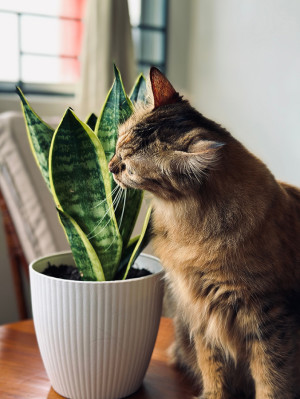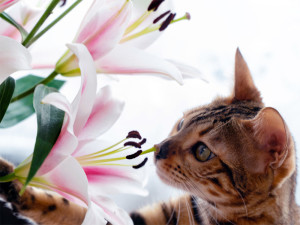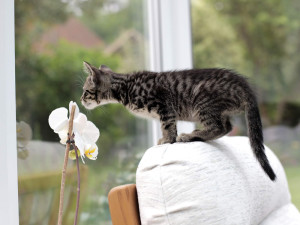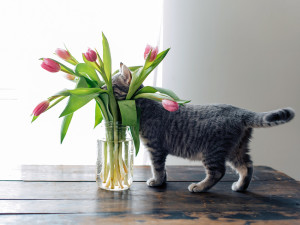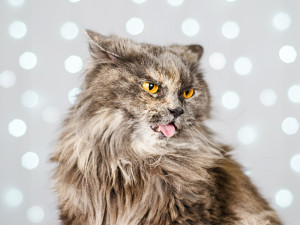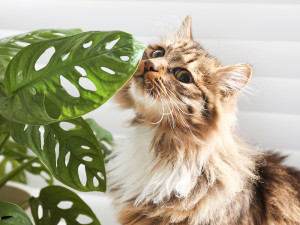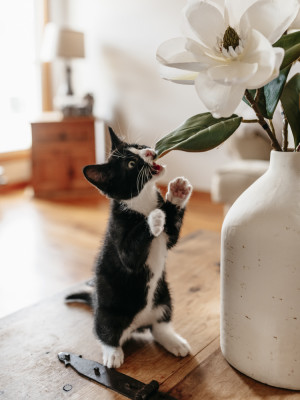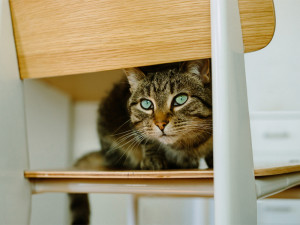Are Petunias Toxic to Cats?
If your kitty is poking exploring your garden, this flower isn’t much of a danger. Here’s why.

Share Article
The common garden petunia, Petunia atkinsiana, is not considered toxic to cats. These plants are frequently used to bring color to the garden; they have beautiful trumpet-shaped flowers that come in a variety of colors including pink, purple, white, and red. While they are typically planted yearly as annuals, they can survive year-round in the right climate as well as indoors.
Even though they are not toxic to cats, they can still make your cat sick if they were to eat too much of the plant matter or other items in the flower pot or garden. Read on to learn more about cats and petunias.
Why are petunias dangerous to cats?
Luckily, petunias are not really dangerous to cats. They do not have toxic compounds that can make cats seriously ill like many other plants. The biggest risk with petunias is that if a cat were to eat a lot of plant matter, even from a non-toxic plant, they are likely to develop digestive upset, including vomiting, diarrhea, and/or gas.
This is because plant matter contains lots of indigestible fibrous material that cats cannot break down. Additionally, cats who are snacking in the garden may also accidentally eat other things like soil, mulch, plastic plant markers, pesticides, and more, which can carry other more serious risks.

What should I do if my cat has eaten petunias?
If your cat chewed on a small amount of a petunia and is acting fine, there is no need for an action plan. Because this is a non-toxic plant, a small lick or bite of the plant won’t cause any harm to your cat. It is very important to be sure of the plant’s identity, however, as many plants may look similar but have very different toxic profiles.
If you are not sure what kind of plant your cat ate, do your best to identify it using a reliable plant resource, such as the ASPCA poisonous plant databaseopens in new tab, or contact your veterinarian or a pet poison hotline to get additional help. In all cases, if your cat is acting sick, it is very important to seek veterinary care right away.
Sometimes, the plant they ate may have nothing to do with their illness, and it is just a coincidence. Other times, it may be that they ate a lot more than you realized or also ate other things that are making them feel sick, so getting to the vet and getting treatment quickly is important.
Diagnosing plant poisoning in cats
If you observed your cat eating a specific plant, this is critically important information to relay to your vet in order to make a quick diagnosis of plant poisoning. Many toxins, from plants to medications to chemicals, can result in similar signs so your vet may not be able to determine exactly what caused your cat’s signs without that information.
Even if you are unsure what kind of plant your cat ate, try to bring in a piece of the plant or a photo to help your vet identify it. Cats who show signs of a toxicity may need a number of diagnostic tests including bloodwork to check their organ function, electrolytes, and blood cell counts. They may also need imaging, like X-rays and an ultrasound to look for foreign material in their digestive tract and/or changes in their internal organs. Even if the exact toxin or plant cannot be identified, veterinarians will administer treatment based on the most likely diagnosis and work to correct your cat’s symptoms.
Symptoms of plant poisoning in cats
Symptoms of plant poisoning will look very different depending on what kind of plant a cat ate and what kinds of toxic compounds it contains. Some signs you might see include:
Digestive upset: Vomiting, diarrhea, and/or gas are frequent signs of illness after a plant ingestion. This may be due to the fibrous nature of plant matter and/or specific toxins in the plant that can irritate the digestive tract. If your cat has multiple episodes of vomiting and/or diarrhea, is not eating, is very lethargic, or has blood in their vomit or stool, they need to go to the vet right away for treatment.
Drooling: Drooling can be the result of nausea, pain, or toxins in the plant that affect the nervous system. Some plant toxins cause irritation to the mouth or tongue, which can cause pain and drooling as well.
Tremors: Tremors, or shaking, may be the result of toxins that affect the nervous system. Sometimes tremors are also a sign of pain and/or generally feeling ill. Tremors should always be checked out by a vet right away as they can worsen and develop into more serious neurological signs.
Pain: Pain is a nonspecific finding that can be caused by toxins as well as other illnesses and/or injuries. Cats are notorious for trying to hide their pain and illness so determining that your cat is in pain can be a challenge. Some cats in pain will hide, avoid contact, stop eating, stop grooming, and/or growl or bite if they are handled. Any cat showing these signs should see a vet right away.
Contact injuries: Some plants contain toxic compounds including caustic oils. This means that when those oils come into contact with the skin or delicate tissues of the digestive tract, they can cause burn-like injuries, blisters, and/or ulcers. These can be very painful and may also cause drooling, and/or a loss of appetite. You may also see these injuries in other parts of the body, including the paws or any other area of skin that came into contact with the oils.
Difficulty breathing: Some plants contain more serious toxins that can lead to difficulty breathing and/or life-threatening complications. Any cat with difficulty breathing needs to see a vet right away.
Treatment
Treatment for plant toxicities is based on treating all of the signs a cat presents with and stabilizing any life-threatening abnormalities they may have. For non-toxic plants that cause mild digestive upset, this may be as simple as just monitoring them at home, or treating them with anti-nausea medications and fluids to maintain hydration.
For more serious toxicities, there may be specific treatments needed to block their effects. Some cats may need more intensive monitoring and treatment in the hospital if they are experiencing serious complications from a toxicity.
How to prevent plant poisoning
As the old saying goes, an ounce of prevention is worth a pound of cure, or a very large vet bill in this case. The best way to prevent plant poisoning is to keep poisonous plants away from your cat. When it comes to the most toxic plants for cats, the safest option is to keep them out of your home entirely. If you have other plants that are less toxic but still should not be kitty snacks, keep them in a room with a closed door that is completely off-limits to your cat when unsupervised.
Don’t be deceived into thinking that your cat can’t reach a plant on a high shelf or window sill; they are parkour wizards. While some cats may respond well to training techniques to keep them off certain parts of the furniture or out of certain places, it is too risky to trust that these strategies will be enough to prevent a serious plant poisoning. Anything that can cause them serious illness or injury, including toxic plants, medications, and chemicals, should always be kept completely out of reach.
Are all parts of petunias safe for cats to eat?
All parts of the common garden petunia are safe for cats to chew on in small amounts. Like all plants, they can still cause digestive upset if a cat were to eat a large amount of the plant material. Additionally, cats may get sick from ingesting other things associated with the plant including soil that may contain intestinal parasites, mulch, pesticides, and/or plastic from the plant markers.
It is best to monitor your cat closely around all plants. And be sure to redirect them if they are gorging themselves on a plant or getting a little too curious about other unsafe items in the garden.
How do I stop my cat from eating petunias?
Once again, prevention is the best way to keep your cat safe when it comes to ingesting things they shouldn’t. If you have petunias indoors, you may need to keep them in a room that is off-limits to your cat.
You can also work on training strategies to help redirect your cat’s attention to other things. If your cat is eating plants outside in your garden, it may be best to keep them indoors to prevent them from getting sick and to protect them from other dangers they may encounter outdoors. For cats who love to spend time outdoors and explore, the safest option may be an enclosed catio or training them to walk on a leash so you can protect them from some of these dangers.
The bottom line: are petunias poisonous for my cat?
Petunias are not poisonous for cats and are a good choice for a pet-safe garden. At the same time, they can still make your cat sick if they were to consume a large amount of plant material. It is always important to monitor your cat around plants, even non-toxic plants, and to remove the plant and redirect your cat if they are eating large amounts.
Also, be sure to familiarize yourself with the plants in and around your home so you know which ones, if any, are toxic to your pets and keep those out of reach or remove them from your home altogether.
Other plants that are safe for cats
Spider plants are non-toxic to cats and are easy to keep indoors.
Orchids are also non-toxic, beautiful houseplants.
Roses are non-toxic. too, but you should be cautious if they have thorns.
Other plants that are dangerous for cats
Lilies are notoriously toxic to cats and should be kept far out of reach.
Snake plants are also considered toxic, although they usually don’t cause life-threatening signs.
Some types of daisies are also toxic to cats.
References:

Dr. Amy Fox, DVM
Amy Fox, DVM is a small animal veterinarian in New York City with over thirteen years of experience in a mixture of general practice, emergency medicine, and shelter medicine. A lifelong animal lover, Dr. Fox studied biology in college and then worked as a veterinary nurse before pursuing veterinary school at Cornell University. Her expertise includes surgery, dentistry, and management of chronic conditions, and she is interested in toxicology, pain management, nutrition, care of senior pets, and educational outreach. Dr. Fox also enjoys writing about veterinary medicine and teaching, and her work has previously appeared in Spruce Pets. In her free time, she loves to cook, garden, go for long runs, and hang out with her goofy mixed-breed dog May, who provides never ending comic relief!
Related articles
![grey and white cat with tongue sticking out]()
Why Does My Cat Keep Throwing Up?
Here’s when you should worry.
![cat sniffing a plant]()
Household Plants That Are Toxic to Cats
These plants might be beautiful, but they’re deadly to feline foragers.
Are Daisies Toxic to My Cat?
They’re cute in the garden, not so much for your cat. Here’s why.
How to Stop Your Cat From Munching On All of Your Precious Plants
Tips to get your cat to quit eating your greens.
![Cat sitting on a kitchen chair, looking at the camera]()
How to Cat-Proof Your House
Ten steps for keeping your cat out of trouble.

